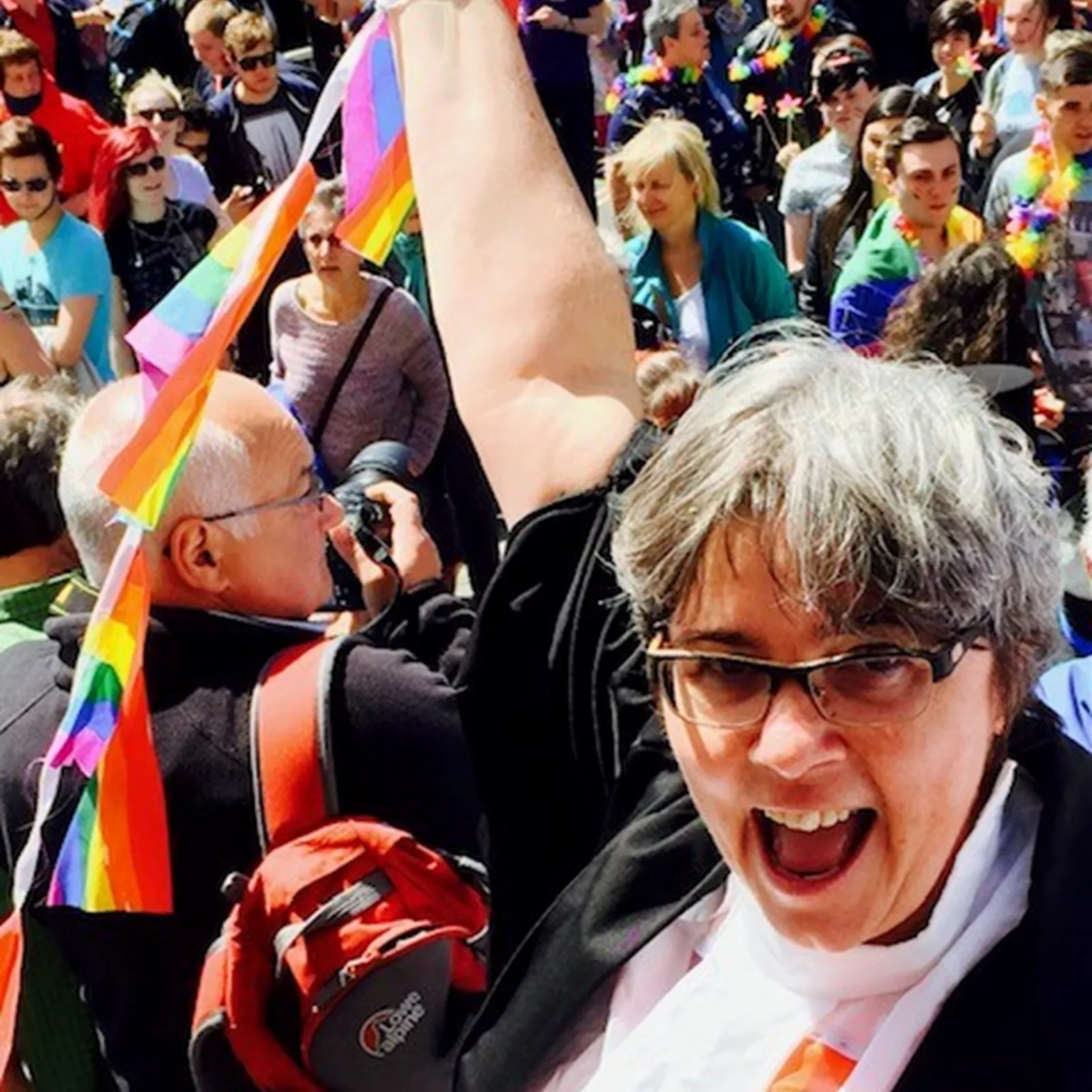LGBTQ+ lawyers are not a monolith, and each of us face individual challenges in our traditionally conservative profession. There are however many issues we face collectively, as I have discovered time and again in my volunteer role on the Law Society of England and Wales Committee of the LGBTQ+ Solicitors’ Network.
By Bridget Garrood
(The views and opinions expressed are those of the author)
- Our existence as LGBTQ+ lawyers is valid, even if others tell us it is not, or actively campaign against our rights, or against legal reforms which would make our life more manageable.
- Taking time to celebrate or look after ourselves is not selfish. Given that there are organisations, individuals and jurisdictions wishing us fewer rights or other harm, self care and Pride are both courageous forms of activism!
- Whether or not we attend Pride events, or conceal our identities for any reason within the professional closet, LGBTQ+ lawyers deserve not only to be accepted at all levels of the legal profession, but to be safe, and celebrated.
I have drawn together some personal viewpoints below, gleaned from 29 years of lived experience as a lesbian lawyer, and talking to / mentoring others, plus my own curiosity and research.
I hope this resource will encourage more LGBTQ+ lawyers to browse the other LawCare support and wellbeing resources. Many of these can support our LGBTQ+ resilience, by which I mean our ability to bounce back from difficult stuff, despite or perhaps sometimes because of the unique challenges presented. I also hope more lawyers will explore the resources and support links for LGBTQ+ lawyers which connect us with each other and our allies, encourage us to step forward as role models, and amplify our voices.
This resource includes sections about:
> LGBTQ+ Minority Stress
> Pride in the Law
> Do LGBTQ+ clients need LGBTQ+ lawyers?
> Where are all the LGBTQ+ legal role Models?
> LGBTQ+ Solicitors Network
> Resources and support links for LGBTQ+ lawyers
I have also written about microaggressions, and tips about how to deal with them in Sick and tired of LGBTQ+ microaggressions?
LGBTQ+ Minority Stress
Internalised stigma and hostile media/political environments can exacerbate self-doubt and cause us to choose the relative safety of concealment within the lonely professional closet over the high risk of harm if we ‘come out’.
Minority stress factors for LGBTQ+ lawyers can include inherently stressful concealment. Dismissive responses to seeking help can invalidate the courage it takes to seek support or report slurs, or challenge microaggressions or bullying passed off as banter. All these experiences can have the effect of situating shame or blame internally, leading to potentially negative experiences of seeking help.
There is a unique risk to LGBTQ+ people seeking help from therapists and organisations to whom they may turn for therapeutic or pastoral support, particularly if they are questioning their sexual orientation or gender identity. This risk is that they will be offered or undergo so-called ‘conversion therapies’; an umbrella term for practices which are already illegal in many countries and which the UK government is committed to ban. Such abhorrent “therapies” aim to change a person’s sexual orientation or suppress a person’s gender identity and may be offered as ‘reparative therapy’, ‘gay cure therapy’, ‘sexual orientation and gender identity change efforts’ or be covertly practised under the guise of mainstream practice without being named. Signatories to the Memorandum of Understanding on Conversion Therapy in the UK include the NHS and the Royal College of Psychiatry, plus accreditation bodies for counselling and various therapies. All agree that the practice of conversion therapy, whether in relation to sexual orientation or gender identity, is unethical and potentially harmful. Some LGBTQ+ lawyers have been through such horrors, and/or have campaigned for many years for the long-promised legislative ban.
LGBTQ+ people seeking a therapist, counsellor or coach (or indeed a lawyer) cannot necessarily be confident that such ‘helping professionals’ have their best interests at heart. In the resources section for this article there are links to specialist directories and services which can, for example, signpost to professionals who work in ways that are affirmative in relation to your individual identity, and will not assume that your identity is related to your reasons for seeking support.
Targeted legal attacks on LGBTQ+ identities by hostile strategic litigants and law makers in jurisdictions previously assumed to be evolving in a progressive direction are causing and re-triggering trauma across LGBTQ+ communities globally. For example, a tsunami of legal and political assaults at state level in the USA reminds LGBTQ+ elders in our own jurisdiction, including lawyers, how recent and potentially fragile are all the LGBTQ+ legal protections for which LGBTQ+ activists fought so hard.
Younger LGBT+ people, including lawyers, who have grown up feeling relatively secure in their rights and with a choice of pride events to attend and with no prior interest in LGBTQ+ activism, are for the first time wondering whether their employment and family law rights may be at risk, whether their gender identity will be legally recognised, or if they will lose their current protections under the Equality Act 2010. The failure to reform the Gender Recognition Act 2004; the dismissal of LGBTQ+ identities as ‘ideology’ ; the criminalisation of LGBTQ+ identities and of affirmative trans healthcare and parenting; the actual and threatened infringement of long held ‘bathroom rights’; plus the so-called ‘Don’t Say Gay’ law in Florida are all too readily recalled examples.
Unsurprisingly perhaps, given our collective history, and in too many cases our personal family histories, LGBTQ+ people can tend towards a protective sensitivity to rejection, including the anticipation of rejection. This can cause us to hold back from feeling able to be ourselves in some situations.
Pride in the Law
The Law Society (of England & Wales) LGBTQ+ Solicitors Network committee were still working under Covid-19 lockdown restrictions, as were most lawyers, when they captured the experiences of over 600 LGBT+ legal professionals and allies for their 2021 report Pride in the Law.
Pride in the Law shows a resilient picture, mainly from those who feel able either always or sometimes to be themselves in their workplaces.
Do LGBTQ+ clients need LGBTQ+ lawyers?
Above all LGBTQ+ clients need culturally competent lawyers who understand their needs. All law firms and those who work in them are effectively ‘customers’ of the Solicitors Regulation Authority (SRA) , who I am reassured are named in the top 25 on Stonewall’s Top 100 Employers list for 2023 and have also secured a ‘Gold Award’ which Stonewall gives to ‘exceptional employers who are committed to supporting their LGBTQ+ staff and customers’.
In outlining their approach to equality, diversity and inclusion, the SRA acknowledge that “some people may be more likely to seek legal help from solicitors with whom they share some social or cultural characteristics” and that “… having diverse employees with a range of expertise and experiences shows people that your firm is likely to understand their community and concerns, increasing access to justice.”
Unfortunately, acting for LGBTQ+ clients as lawyers involves operating in legal systems and sometimes in firms or chambers that can be hostile to LGBTQ+ communities. This all adds to the likelihood of lawyer burnout, and vicarious trauma, but acting for survivors of e.g. homophobic abuse can also be a protective factor which can sustain motivation.
Where are all the LGBTQ+ legal role models?
As LGBTQ+ lawyers we can benefit vicariously from hearing stories of resilience of other LGBTQ+ legal professionals as role models. Being aware of and overcoming challenges despite obstacles is what as lawyers we do for our clients, so it can be incredibly inspiring to realise that LGBTQ+ people are amongst not only our finest lawyers, but some of fiercest champions for the advancement of LGBTQ+ legal rights and reforms.
It is no surprise then that the most pressing issue identified in Pride in the Law by the LGBTQ+ respondents was a lack of visible role models. The lack of LGBT+ role models was a common theme across all types of organisations, with a similar proportion of those working in private practice (17%), inhouse (20%) and for national or local government (19%) identifying it as an issue.
All lawyers can of course benefit from role models, but for those of us with marginalised identities, visible LGBTQ+ role models can foster a sense of belonging. They can inspire, motivate and encourage us by showing us what’s possible, enabling us to share and learn from their challenges and successes.
In the LGBTQ+ calendar there are dedicated days and weeks which ensure visibility – for example Trans Awareness Week in November and Lesbian Visibility Week in April (see this article: Legally Lesbians: 25 lawyers write about their careers and why lesbian visibility is important to them (diva-magazine.com).
There are also visibility initiatives such as the FreeBar Visibility where you can find profiles for 42 barristers, clerks and allies.
Original article written by Bridget Garrood

 Elizabeth Rimmer
Elizabeth Rimmer